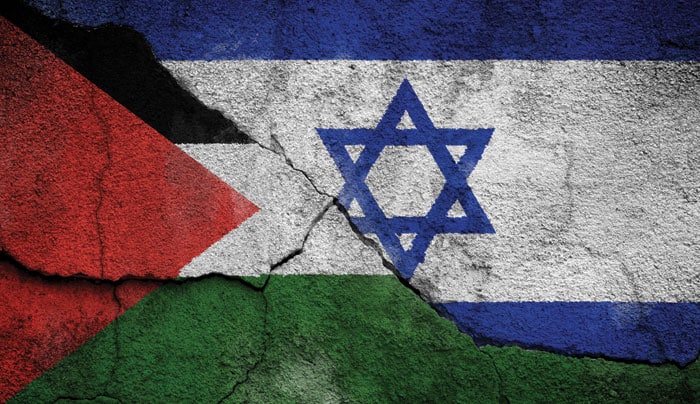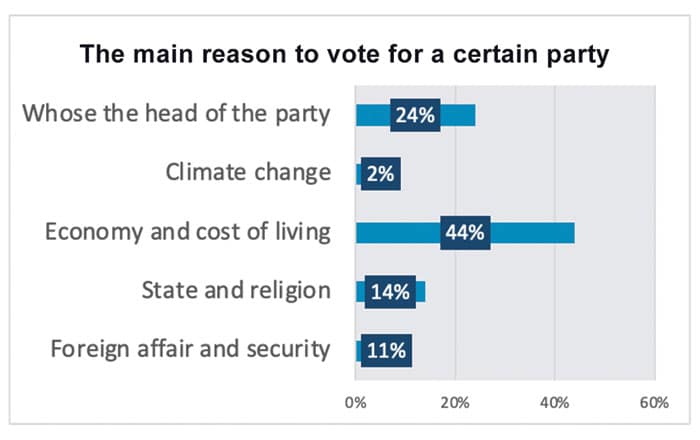 Tuomas A. Lehtinen/Getty Images
Tuomas A. Lehtinen/Getty Images On Sunday evening, two Israeli generals sat on a stage to announce their new partnership. It felt like deja-vu. Not so long ago, Benny Gantz, the head of Blue and White, had a general-partner—Gabi Ashkenazi. He now has a new one—Gadi Eizenkot. Gantz and Ashkenazi had a third partner, a mere civilian, in Yair Lapid, the head of Yesh Atid. Gantz and Eizenkot have a third partner, a mere civilian, in Gideon Saar, the head of New Hope.
The rest is just about the same. The polls didn’t show much movement. The voters did not show much excitement. Another day, another merger, another attempt to break the logjam. If it is interesting, this is because of what’s missing from the debate and the considerations of politicians: the Palestinian issue.
Consider the new party. It has a name that doesn’t translate to anything remotely comprehensive in English. The Mamlachti Camp. It also doesn’t have much meaning in Hebrew. More a sentiment of coherence than a term with specific significance. Never mind that; the new merged conglomerate of two parties and the new joiners is one of split personality when it comes to the Palestinian issue. Eizenkot warns time and again from a possible glide to a reality of “one state.” His position is newspeak for “I support an Israeli withdrawal from parts of the West bank” in some fashion. Saar is a staunch hawk, who opposes the “two state solution.” When his now merged party was formed, one of its stated goals was “realizing the natural and historical rights of the Jewish people in the Land of Israel”—that is, including Judea and Samaria.
Ask: How can Eizenkot and Saar be in the same party? The answer is as simple as it is telling. They can join forces because the Palestinian issue is a non-issue. It is not on the agenda. It is not on the table. So much so, that two leaders with incompatible views can share a party and a platform while disagreeing on what once used to be the key issue for all the main parties.
Not long ago, we tested in a poll what are the issues that Israelis consider to be the most important for the country to deal with. The majority ranked “political challenges” at the top, followed by “cost of living.” There are some Israelis who rated the “peace process” as their first priority but they are very few. Thus, this challenge was placed low in the first-priority rankings, and even lower on a combined ranking of all preferences. That is, because for most Israelis the “peace process” is not just “not first priority,” it is pushed down to the very bottom, last place, or second to last (the list included nine possible challenges to rank).
The leader of another made-up party, the newly formed Zionist Spirit, zeroed in on the Eizenkot agenda: This party, said minister Ayelet Shaked, supports the two-state solution, and hence could not be the political home of true right-wingers. Shaked is fighting for her political career as the head of the party that doesn’t seem to have enough votes to cross the electoral threshold. She will attempt to portray the Gantz-Eizenkot party as “leftist.” Alas, Saar stands in her way, and with him a few other rightwing allies, such as minister Zeev Elkin. So, the truth is that the Mamlachti Camp is neither left nor right on the Palestinian issue, it is incoherent. It is of two contradicting minds. And that’s the point: being of two minds on an issue is only possible when the issue isn’t important. No voter is troubled if one leader of a party prefers the color green, and the other leader prefers the color purple. Likewise, the voters do not seem to be bothered by the fact that one leader opposes settlements, and one supports settlements. You say potato, I say potato. Whatever.
The Palestinians aren’t going anywhere, and the challenge of having to deal with them is one of the most complicated and fateful for the future of Israel.
This is both telling and dangerous. On the one hand, it demonstrates the extent to which the Palestinian issue is marginalized as a wedge issue for Israelis. They might disagree on long-term goals but agree that the short-term prospect for meaningful breakthrough is non-existent and hence see no reason to debate the issue or focus on it. On the other hand, this is a head in the sand position. The Palestinians aren’t going anywhere, and the challenge of having to deal with them is one of the most complicated and fateful for the future of Israel. Some might dare to suggest: it is even more indicative of whether Netanyahu stays or goes. But clearly, that’s not the current position of most Israeli voters.
Something I wrote in Hebrew
Following operation Breaking Dawn in Gaza last week I wrote this: Israel has done work that serves the interests of Hamas. There’s nothing wrong with that, but it’s worth mentioning. It is worth mentioning that Israel’s interest and that of Hamas in the context of Islamic Jihad are quite similar. Hamas wants to control Gaza, and Israel wants Hamas to control Gaza. On the one hand, if it wants Hamas to rule, why would it do the work for them? Israel could have told Hamas to calm down Islamic Jihad or bear the consequence. On the other hand, maybe if Israel does some work for Hamas it will become easier for its leaders to also make some demands, and see a positive response.
A week’s numbers
What are Israelis voting on? See the column above, and also these new numbers from an IDI survey.

A reader’s response:
Shira Golhorn wrote: “When I read in your column how much Israelis no longer care about Palestinian lives it fills me with despair.” Dear Shira, this is an ongoing violent conflict, and there’s our side and the side of the enemy. Of course, the side of the enemy includes many good people, innocent people. That’s the tragedy of war: It is not easy to keep thinking about the wellbeing of one’s enemy.
Shmuel Rosner is senior political editor. For more analysis of Israeli and international politics, visit Rosner’s Domain at jewishjournal.com/rosnersdomain.























 More news and opinions than at a Shabbat dinner, right in your inbox.
More news and opinions than at a Shabbat dinner, right in your inbox.